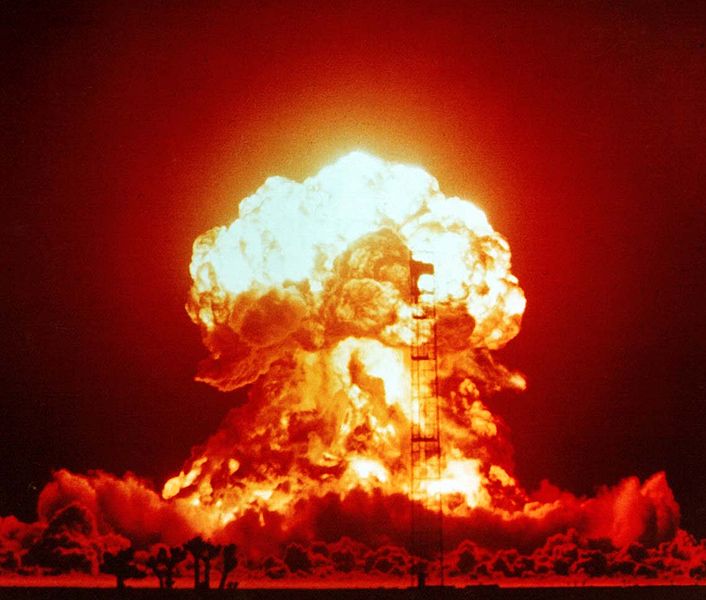New efforts on nuclear disarmament
For years after the end of the Cold War, the extreme danger of nuclear weapons and the moral obligation to achieve “nuclear zero” seemed to command little serious attention from governments or from the public at large.
The following article appeared in the September-October 2013 issue of NewsNotes and was prepared by Marie Dennis.
For years after the end of the Cold War, the extreme danger of nuclear weapons and the moral obligation to achieve “nuclear zero” seemed to command little serious attention from governments or from the public at large. While experts struggled to reduce the danger of inadequately secured nuclear weapons following the dissolution of the Soviet Union, fears about nuclear proliferation focused narrowly on a few countries and were largely divorced from any commitment to nuclear disarmament.
Although nuclear disarmament was not the foremost issue on the foreign affairs agendas of most nations, efforts to achieve a Comprehensive Test Ban Treaty, to sustain the Nuclear Non-Proliferation Treaty and, eventually, to negotiate a new START Treaty continued. Meanwhile, many people of faith and other peace workers, including Ploughshares activists, kept pointing to the very real nuclear danger that remained. For an overview of nuclear disarmament efforts see the UN Office of Disarmament Affairs website at http://www.un.org/disarmament/WMD/Nuclear.
More recently, however, nuclear disarmament has again come to the fore as a critical concern. In June, President
Obama reiterated his commitment to move toward a world without nuclear weapons, although his agenda was criticized as too limited and incremental. For example, he “missed an opportunity to remove quickly from ‘hair trigger’ alert at least some of the 1,000 weapons that are ready to fire at a moment’s notice.” (New York Times, June 22, 2013)
Meanwhile, many other nations are calling for action on nuclear disarmament. Reaching Critical Will, a project of the Women’s International League for Peace and Freedom (http://www.reachingcriticalwill.org) reports on the 2012 United Nations General Assembly decision to convene an open-ended working group (OEWG) to “develop proposals to take forward multilateral nuclear disarmament negotiations for the achievement and maintenance of a world without nuclear weapons.” Chaired by Ambassador Manuel B. Dengo Benavides of Costa Rica, the OEWG met in Geneva in May, July and August this year. On September 26 the UN will hold a High-Level Meeting on Nuclear Disarmament in New York.
Other recent efforts to address the nuclear threat include a March 2013 conference in Oslo on the Humanitarian Impacts of Nuclear Weapons. A second conference on the topic is scheduled for early 2014 in Mexico. A planned conference on a Weapons of Mass Destruction Free Zone in the Middle East Zone was postponed indefinitely. (For background see Nuclear Age Peace Foundation, http://www.wagingpeace.org.)
Because the United States boycotted the Oslo conference, voted against establishment of the OEWG, and has been silent on the High-Level Disarmament Meeting, two dozen peace and disarmament groups, including Pax Christi USA, sent a letter to the White House on June 6 and launched a campaign calling for good faith U.S. participation in these multilateral forums:
The world is urging the United States to join in multilateral efforts to achieve the global elimination of nuclear weapons. The time is right. As you said in Berlin, “so long as nuclear weapons exist, we are not truly safe.”
We call on the United States to participate, with you speaking, in the September 26, 2013 United Nations High level Meeting on Nuclear Disarmament; participate in the UN working group on achieving a world free of nuclear weapons; pursue vigorously convening of the postponed conference on a Middle East Zone free of Weapons of Mass Destruction; and attend the 2014 conference in Mexico on the humanitarian impacts of nuclear weapons.
The world and our country must prioritize meeting human needs over weapons of mass destruction.
Faith in action:
As a nuclear power, the United States must play a leadership role in moving the world toward nuclear disarmament. A limited, step-by-step agenda is entirely inadequate. Massive public support for nuclear zero is essential if any real progress is to be made. Write or email President Obama and use the points listed in the June 6 letter (above) to urge him to take action.
Excellent resources are available to help you educate about the nuclear threat and organize for nuclear disarmament. For example:
Breaking the Nuclear Chain (http://www.breakingthenuclearchain.org) is a campaign to motivate people to prevent the looming humanitarian catastrophe represented by the nuclear chain from uranium mining, to power, to weapons to nuclear waste.
Abolition 2000 (http://www.abolition2000.org), a network of over 2,000 organizations in more than 90 countries worldwide working for a global treaty to eliminate nuclear weapons, has produced a “Manual for Campaigners to support the UN Open Ended Working Group on Nuclear Disarmament (OEWG).”

